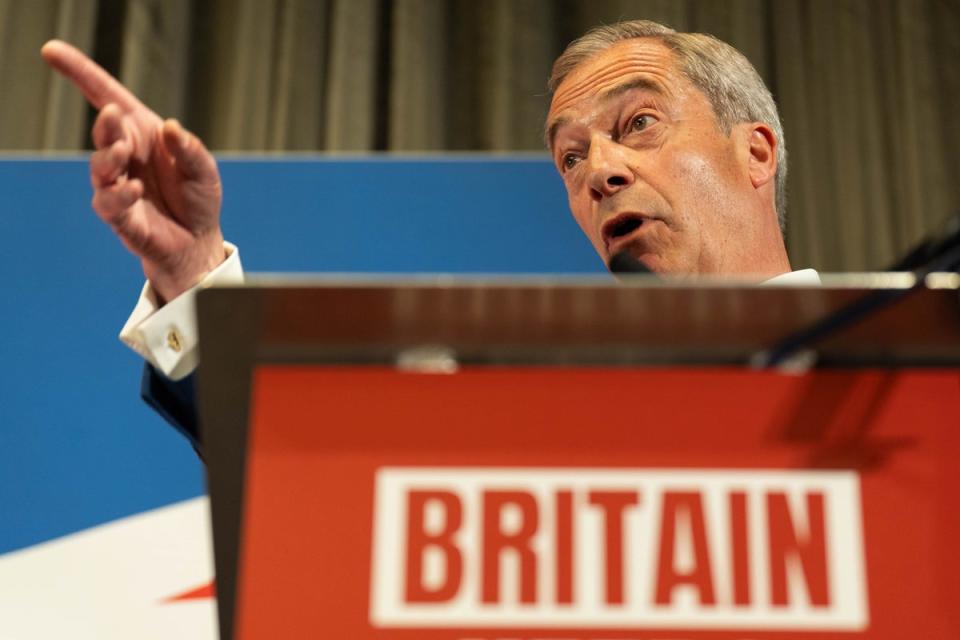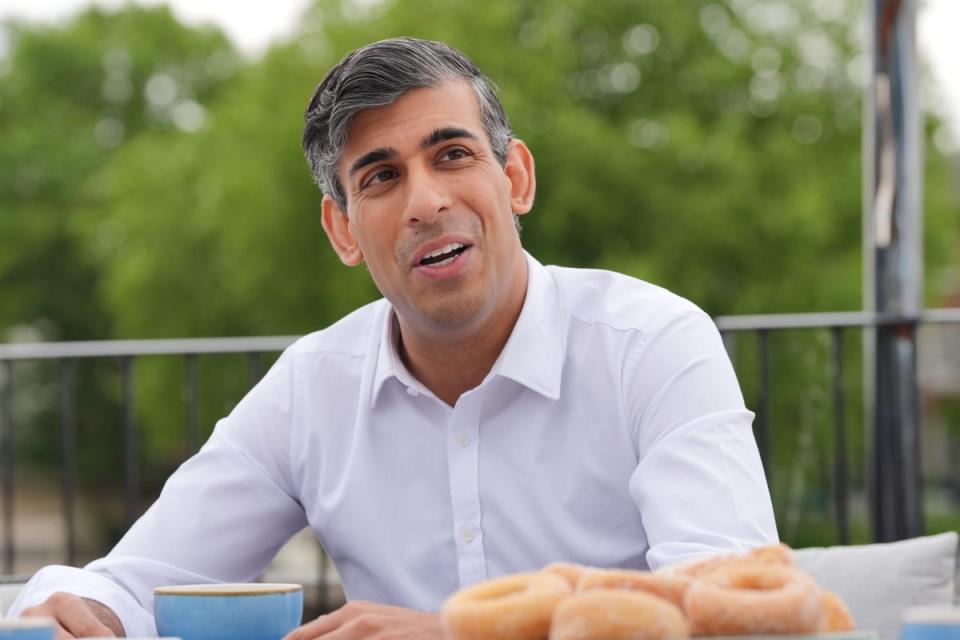Tories face ‘existential risk’ as Farage declares he will stand as a candidate for Reform UK
Nigel Farage has electrified the general election campaign, taking over as leader of Reform UK and launching a bid to become an MP.
As first revealed by The Independent, Mr Farage will run in Tory-held Clacton in Essex in what is already being described as “an existential risk” for the Tories.
The decision comes as a major blow to Rishi Sunak’s electoral hopes, as the former Ukip leader – who had said he would not run to be an MP – confirmed he had changed his mind and decided to contest the general election.
Within hours of the revelation, Tory MPs and candidates were being asked to attend a briefing on an “immigration lock” pledge which means a Conservative government would set a legal limit on annual immigration figures. The move was being seen as a bid to stop Reform UK and Mr Farage splitting the vote on the right.
Mr Farage’s announcement came on a day when two major polls suggested that the Tories were already heading for a historically bad defeat. A YouGov MRP poll of 12,000 people predicted Labour will have its biggest ever majority, of 194, with the Tories marooned on 140 seats.
Earlier a Redfield and Wilton poll of 10,000 voters put Labour 26 points ahead of the Conservatives on just 20 per cent, suggesting the party could be down to a mere 24 seats. This followed an MRP poll at the weekend suggesting the Tories could be down to 66 seats.
Click here for our live coverage of the general election campaign.

However, leading pollsters said that the news of Mr Farage standing as a candidate makes the outlook even worse for the Tories.
Polling guru Professor Sir John Curtice described the intervention as “important”.
Lord Hayward, a Tory peer and top pollster, told The Independent that Mr Farage’s original decision not to stand meant Reform’s vote would be much lower than is reflected in the polls and “had been the most damaging thing for any single party”.
Luke Tryl from More in Common pollsters tweeted: “Given that our MRP [projection] was prior to Nigel Farage saying he was taking over as leader [of] Reform UK and had the Tories losing 185 seats and holding another 50 by less than 4 per cent, I think it is fair to say his decision poses an existential risk to the Tory party.”
Mr Farage’s return as leader of Reform UK came with a promise to serve for five years alongside the Conservatives in opposition. Former leader Richard Tice will become party chairman.
Explaining his bid to become an MP, as first revealed exclusively by The Independent at Monday lunchtime, Mr Farage said he could not let down “millions of people” who had supported his past political projects.
At what he dubbed an emergency press conference, he added: “Something is happening out there.
“There is a rejection of the political class going on in this country in a way that has not been seen in modern times.”
A Conservative Party spokesman said: “Nigel Farage risks handing Keir Starmer a blank cheque to rejoin the EU, impose the retirement tax on pensioners and hike taxes on hardworking Brits up and down the UK.
“Farage knows that Reform won’t win any seats, but he doesn’t seem to care that a vote for Reform only helps Labour. He’s doing exactly what Keir Starmer wants him to do.
“Just yesterday, EU insiders openly voiced their expectation that Starmer would seek a softer Brexit deal, opening the door to rejoining the EU altogether. That would mean uncontrolled immigration and betraying the will of the British people. Is Farage really willing to risk undoing his life’s work by handing Starmer a blank cheque to rejoin the EU?”
Mr Farage is taking a risk because he has never won a parliamentary seat in seven previous attempts. He has, though, won European parliament national elections as the leader of Ukip and the Brexit Party (now Reform UK).
On Monday, he said he has only stood once “in earnest”, a time he said the Conservatives cheated. “All the previous times it was as a pressure group to raise the profile of why we believed leaving the EU made sense when nobody else in parliament was saying it.”

He also declared that Labour has already won the election and there is no contest between Mr Sunak and Sir Keir Starmer, saying that Reform believes the current general election campaign is “the dullest, most boring election we have ever seen”. “We think this election needs a bit of gingering up,” he added.
Setting out Reform’s longer-term ambitions, Mr Farage said it would form the opposition in the next parliament and be the biggest party at the general election in 2029. “That is the ambition, simple as that,” he added.
And he said the party will surprise everybody, getting far more votes than the 3.9 million won by Ukip in 2015.
He added: “When people start to realise in the red wall, with Reform second to Labour, when they start to realise that actually in those seats, it’s a Conservative vote that’s a vote for Labour, it’s a Conservative vote that is a wasted vote, then I think we might just surprise everybody.
“We are appealing to Conservative voters, we are appealing to Labour voters.”
Responding to the announcement, Liberal Democrat deputy leader Daisy Cooper said: “The Conservative Party has already become the mirror image of Nigel Farage’s Reform.
“Rishi Sunak’s constant pandering to Reform has horrified former lifelong Conservative voters in the centre ground.
“Sunak must show some backbone and rule out Farage ever joining the Conservative Party in future, including if he gets elected to be an MP.”
The YouGov MRP polling, before Mr Farage’s declaration, gave the Tories the most optimistic outcome but still had them facing the worst defeat in their 346-year history.
It suggested Labour would have a 194 majority, with 422 seats, compared to the Tories on just 140 and Lib Dems on 48, boosted by a tactical voting campaign revealed by The Independent over the weekend.
The result would mean big names including chancellor Jeremy Hunt, leader of the House Penny Mordaunt, and Brexiteer Jacob Rees-Mogg would lose their seats.
But other polls suggested that the result could be even worse – even before Mr Farage decided to stand. The Redfield and Wilton poll of 10,000 voters put Labour 26 points of the Torie, 46 per cent to 20 per cent. This could leave the Conservatives with a mere 24 seats and director of research Philip van Scheltinga confidently predicted they will get “less than 100 seats”.
Techne UK has been predicting fewer than 100 seats for the Tories for months since the fall of Boris Johnson.
Techne chief executive Michela Morizzo suggested that the Tuesday night head-to-head leaders debate between Mr Sunak and Sir Keir Starmer might be a last chance for the prime minister.
She said: “In this particular case, I believe that the debate will be useful to consolidate the opinion of those who have already formed their own opinion and have clear ideas about who to vote for. Certainly, even some undecided electors may have clearer ideas after the debate – especially the less informed – but whether this can close the gap is difficult to say now, but above all difficult to achieve.”
Lord Hayward noted: “There are many undecided voters out there, particularly 2019 Tory voters. The prime minister’s best hope is to try to appeal to them. This means that, unusually, this debate may offer him a chance.”
However, Sir John Curtice warned that TV debates are unlikely to change things with the only major shift coming with “Cleggmania” when former Lib Dem leader Nick Clegg took the first 2010 debate by storm.
He said: “It’s a chance [for Sunak] but no more. The two head to heads in 2019 were followed by only marginal shifts in the polls – slightly to Labour’s advantage. Nothing has ever replicated the impact of the first [three-way] debate in 2010.”

 Yahoo News
Yahoo News 
